Uncategorized
What a forgotten synagogue dedication in 1825 Philadelphia can teach us today
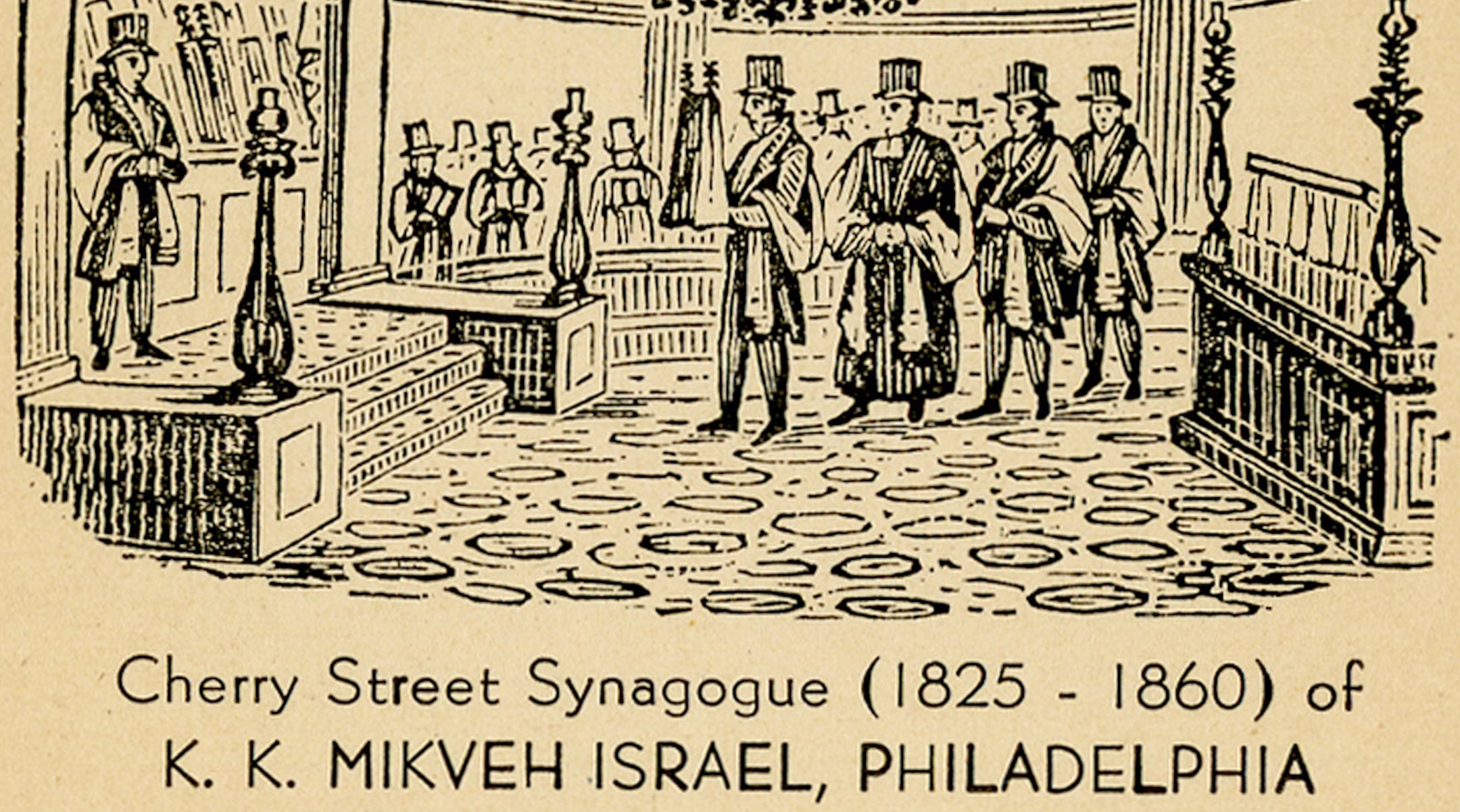
On a winter morning in 1825, Congregation Mikveh Israel in Philadelphia opened its doors for a consecration few in the city would forget.
The sanctuary filled not only with Jews but with the city’s civic and religious leaders. Bishop William White, the Episcopal bishop of Pennsylvania, was there. So too were the chief justice and associate judges of the state Supreme Court, along with ministers from other Christian churches and “many other distinguished citizens.”
The newspaper that covered the event could hardly contain its admiration. It called the ceremony “one of the most gratifying spectacles we have ever witnessed,” praising it as evidence of “the happy equality of our religious rights, and the prevailing harmony among our religious sects.”
For Europeans in attendance, the sight was almost inconceivable. They remarked that such a scene could not be witnessed “in any other part of the world” — Jews worshiping openly, honored by civic leaders, regarded as full equals. They urged that the moment be noticed abroad “for the instruction and edification of Europe.”
This long-forgotten consecration reveals something about Jewish life in America that is too often overlooked. Alongside well-known stories of antisemitism and exclusion, there have long been moments when Jewish life was welcomed as part of the civic square — when synagogue dedications became community milestones, not private affairs.
Just three years earlier, when Mikveh Israel laid the cornerstone for its building, its members placed into the foundation a copy of the U.S. Constitution, the constitutions of several states, and American coinage. Embedding the nation’s founding charter into the walls of a synagogue was both symbolic and aspirational.
In Europe, the picture was far more precarious. In Wiesbaden in 1826, Jews converted a garden hall into a synagogue. The community’s rabbi, Salomon Herxheimer, preached a sermon heard by neighbors “without distinction of worship.” Yet this was a fragile moment of recognition. For centuries, Wiesbaden’s Jews had lived as Schutzjuden — “protected Jews” — dependent on the goodwill of local nobles, barred from land ownership, and restricted in their trades. Only in 1819 were they granted theoretical freedom of commerce, and even then, their rights remained uncertain.
Similar stories unfolded later in Munich in 1869, where the King of Bavaria donated land for a synagogue, or in Berlin in 1866, where thousands, including Otto von Bismarck, gathered in a new sanctuary that newspapers as far away as Australia described with awe. These were real milestones, but they were fragile. Within living memory, those very synagogues would be destroyed on Kristallnacht in 1938.
The contrast is telling. In Philadelphia, non-Jews filled a synagogue in 1825 to celebrate Jews as civic equals. In Central Europe, recognition also came, but less often — and it was never secure.
Jewish history is often told as a story of persecution — expulsions, pogroms, restrictions. That history is real, but it is not the whole story. There have also been times, often little remembered, when Jews were embraced as neighbors and citizens. Ancient Judaism was visible far beyond the Land of Israel — in places like Adiabene (in northern Iraq) and Himyar (in Yemen) — and its theology helped shape the rise of both Christianity and Islam. In medieval Spain, convivencia — imperfect but real — allowed Jewish culture to flourish alongside Muslim and Christian communities. For generations in small towns across America, non-Jews sometimes contributed money, labor, or land to help build synagogues.
These histories matter because they remind us that belonging is never preordained. It is chosen in every generation — and it is possible.
Today, that lesson feels urgent. Antisemitism is again on the rise, from violent attacks like the one on Yom Kippur in Manchester to the spread of conspiracy theories online. Debates over Zionism and the future of Diaspora life have also become more polarized, often framed in absolutes: either Jews can only be safe in a sovereign state, or Diaspora life is doomed to fade away.
The 1825 consecration in Philadelphia tells another story. It shows that Jewish life in the Diaspora has not only survived but, especially in places like the United States, thrived in public — long embraced as part of the civic fabric. It also shows how precious those moments can be: roots of belonging that must be tended, not assumed.
As Europeans present that day observed, America’s pluralism was something worth sharing with the world. Nearly two centuries later, the challenge remains the same. Do we remember these paths of belonging, or do we forget them and leave only the stories of hatred to define our past?
I first began asking these questions while researching small-town Jewish communities in Ohio and New York. In many of those places, the synagogues are gone and the Jewish population has dwindled, yet I found records of interfaith choirs singing, neighbors contributing to building funds, and civic leaders marching alongside rabbis.
Those memories could easily vanish. In Lancaster, Ohio, my hometown, the synagogue closed in 1993, its building later sold. Yet the remaining members created a Jewish book fund that allowed me, years later, to discover a volume of Jewish learning in the local library — a spark that shaped my own path into Judaism.
Who tells these stories when the buildings are gone and the communities have disappeared? Who remembers the moments of belonging as well as the moments of exclusion?
The consecration of Mikveh Israel in 1825 was, for its witnesses, proof that something remarkable was possible: Jews and non-Jews together, celebrating equality, showing Europe another way. We should remember that moment not as a quaint curiosity but as a challenge. Belonging is not guaranteed. It must be chosen in each generation, in every place.
The people who filled that sanctuary in 1825 knew this. They saw in Philadelphia something they believed could not be found elsewhere — a vision of belonging worth teaching the world.
—
The post What a forgotten synagogue dedication in 1825 Philadelphia can teach us today appeared first on Jewish Telegraphic Agency.
Uncategorized
Reza Pahlavi, Iran’s exiled crown prince, has a plan for his people’s future — if they’ll have him
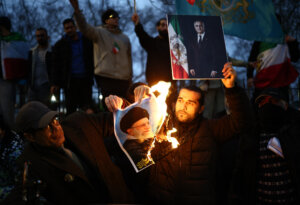
With a U.S.-Israel bombardment underway and President Trump and Prime Minister Benjamin Netanyahu openly pressing for regime change, related questions now loom large: What are the Iranian people prepared for — and who, exactly, is positioned to lead them if the Islamic Republic falls?
Since late 2025, anti-regime protests have spread across Iran, resulting in mass arrests, imprisonments, and thousands killed in crackdowns by regime forces. On January 14, following massive demonstrations, President Donald Trump posted on Truth Social, addressing Iranian protesters: “KEEP PROTESTING – TAKE OVER YOUR INSTITUTIONS!!!… HELP IS ON ITS WAY.” At the time, expectations were high for a U.S. strike on Iran, and thousands of protesters were killed in the streets, hoping that help would come. Now, over a month later, Trump appears to have made good on that promise.
Early on Feb. 28, U.S. and Israeli forces began operating across Iran in what the IDF described as a “close and unprecedented cooperation between the IDF and the US military.” Trump and Netanyahu both made statements indicating that the objective of the joint operation extends beyond military deterrence and toward regime change.
Since the start of the operation, the U.S. and Israel have targeted several sites that go far beyond the aims of the 12-Day War, which primarily focused on degrading Iran’s nuclear and ballistic missile capabilities. In this round of strikes, regime assets and figures have been targeted, including Supreme Leader Ali Khamenei, who was killed by an Israeli strike. During the 12-Day War, the US reportedly instructed Israel not to target the Supreme Leader.
Israeli officials say they eliminated several other top officials, including the commander of the Islamic Revolutionary Guard Corps (IRGC), the commander of the Iranian Armed Forces, the Iranian Minister of Defense, and the head of Iranian Intelligence.
Videos have circulated on social media showing Iranians cheering on the attacks, even as reports indicate that the regime has shut down the internet and is jamming satellite signals from diaspora news channels that would otherwise provide critical information about the strikes.
Chants heard across Iranian cities include“death to Khamenei” and “long live the Shah.” Other videos display Iranians honking their cars and chanting “Azadi,” the Farsi word for freedom, dancing in the streets, and gleefully laughing while watching a plume of smoke rise from Khamenei’s residence.
Still, the killing of senior officials — even the Supreme Leader — does not automatically translate into regime change. Even if Ali Khamanei’s death and that of other senior Iranian officials destabilize the clerical regime, there remain 1 million members of the Revolutionary Guard militia and 200,000 members of the IRGC who play a vital role in propping up the government.
Reza Pahlavi, potential leader?
Former Iranian Crown Prince Reza Pahlavi, who lives in the United States, has emerged as one of the most visible opposition figures.
Since January, videos have surfaced on social media showing Iranian protesters calling for the return of the Pahlavi dynasty, which ruled Iran until the 1979 Islamic Revolution. Videos show demonstrators chanting pro-monarchy slogans or displaying the pre-revolutionary Iranian flag. After Pahlavi publicly called for mass mobilization of protestors earlier this year, the demonstrations escalated, with some protestors holding up photos of him in the streets.
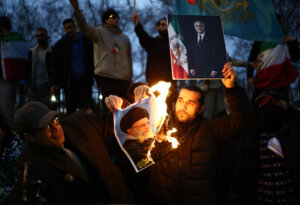
The son of the former Shah, Pahlavi was born in Tehran in 1960. He was formally named Crown Prince at age 7 during his father’s coronation. At 17, he became one of the youngest licensed pilots in Iran before leaving for the US to pursue advanced flight training. While he was abroad, the 1979 Islamic Revolution overthrew his father and abolished the monarchy, turning what was meant to be a temporary study into permanent exile. He has not returned to Iran since.
Today, Pahlavi lives in Maryland with his wife and three daughters, one of whom married a Jewish businessman last summer. He has positioned himself not as a monarch-in-waiting, but as a potential transitional leader. He has repeatedly stated that he does not seek to restore the monarchy, instead advocating for a secular, democratic system. U.S. officials have taken notice: following renewed unrest in January, he reportedly met with Steve Witkoff, top Middle East advisor to Trump.
Behind Pahlavi is a network of advisers drawn largely from the Iranian diaspora, including academics, private-sector executives, and professionals with experience in US government institutions. Some serve in formal roles, while others function as informal advisers. His main organizational platform is the National Union for Democracy in Iran (NUFDI), a Washington-based organization that has for years promoted regime change in Iran with Pahlavi’s support. Under NUFDI, Pahlavi and his team developed the Iran Prosperity Project, a governance blueprint intended to guide the country through a post-Islamic Republic transition.
On the eve of the joint U.S.-Israeli operation, Pahlavi unveiled an updated version of his transitional plan. The document outlines Iran’s urgent priorities during the first six months following a potential regime collapse.
About two hours after the initial strikes in Iran, Pahlavi posted a video to X, encouraging Iranian forces to abandon the regime and telling the Iranian people that he will “announce to you precisely” when they “can return to the streets for the final action.”
His prospects remain contested. Analysts have long questioned whether a figure who has lived outside Iran for nearly five decades can command broad domestic legitimacy. Reliable polling inside Iran is difficult, but Dutch pollster Ammar Maleki has found that roughly one in three Iranians expresses confidence in Pahlavi based on large-sample surveys conducted in recent years. At the same time, a similar proportion strongly oppose him. Nonetheless, Maleki asserts, no other opposition figure approaches his level of name recognition.
Pahlavi is also openly pro-Israel. He has traveled to Israel, prayed at the Western Wall, met with Netanyahu, and advocates for expanding the Abraham Accords into what he calls “Cyrus Accords” between Israel and a future Iran, describing the two nations as the “only two countries on this planet that can claim to have a biblical relationship.” Because of his pro-Israel stance, some detractors frame his potential leadership as aligned more with Western and Israeli interests than with those of the Iranian people.
However, in recent months, experts have increasingly framed him as a viable option — or at least as an integral part of the current protest movement that should not be ignored.
The post Reza Pahlavi, Iran’s exiled crown prince, has a plan for his people’s future — if they’ll have him appeared first on The Forward.
Uncategorized
Iranian Leader Khamenei Killed in Strikes, Israel Says

Iran’s Supreme Leader Ayatollah Ali Khamenei speaks during a meeting in Tehran, Iran, Jan. 3, 2026. Photo: Office of the Iranian Supreme Leader/WANA (West Asia News Agency)/Handout via REUTERS
The United States and Israel launched the most ambitious attack on Iran in decades on Saturday, and Israel said Supreme Leader Ali Khamenei had been killed in the operation.
Khamenei’s body has been found, a senior Israeli official told Reuters. Iranian news agencies Tasnim and Mehr, however, reported that the supreme leader was “steadfast and firm in commanding the field.”
Iran called the strikes unprovoked and illegal and responded with missiles fired at Israel and at least seven other countries, including Gulf states that host U.S. bases.
US President Donald Trump, who made the biggest foreign-policy gamble of his presidency after campaigning for reelection as a “peace president,” said the strikes were aimed at ending a decades-long threat from Iran and ensuring it could not develop a nuclear weapon.
Trump called on Iranian security forces to lay down their weapons and invited Iranians to topple their government once the bombing ended.
The US president later on Saturday told NBC News that “most” of Iran’s senior leadership has been killed. He said he believes reports of Khamenei’s death are accurate. “We feel that that is a correct story,” Trump told NBC News in a phone interview, according to a report on its website.
Israeli Prime Minister Benjamin Netanyahu said there were many signs indicating Khamenei “is no longer” and called on Iranians to finish the job. He said Khamenei’s compound had been destroyed, and Revolutionary Guard commanders and senior nuclear officials had been killed.
Three sources familiar with the matter said Iranian Defense Minister Amir Nasirzadeh and Revolutionary Guards commander Mohammed Pakpour were killed in the Israeli attacks. Iranian media had said Khamenei’s son-in-law and daughter-in-law were also killed.
‘WE ARE TERRIFIED’
In cities across Iran, explosions caused widespread panic.
“We are scared, we are terrified. My children are shaking, we have nowhere to go, we will die here,” mother-of-two Minou, 32, said weeping as she spoke to Reuters by phone from the northern city of Tabriz.
Iran responded by launching missiles at Israel and at several Gulf Arab countries that host US bases.
After confronting hundreds of Iranian missile and drone attacks, the Pentagon said there were no US deaths or injuries.
The US military named the campaign Operation Epic Fury.
Iran issued a warning that the Strait of Hormuz, the narrow passage through which around a fifth of global oil consumption passes, had been closed. Traders expected a sharp jump in oil prices. Airlines canceled flights in the Middle East.
Tehran promised a stronger response to come, with a senior Iranian Revolutionary Guards commander, Ebrahim Jabbari, saying it had so far used only “scrap missiles” and would soon unveil unforeseen weapons.
The U.N. Security Council was due to meet in New York on Saturday. Secretary-General Antonio Guterres called for an immediate cessation of hostilities.
Israel‘s military said some 200 fighter jets had completed the largest flying mission in its history, hitting 500 targets throughout Iran including strategic defense systems already damaged in strikes last year.
A girls’ primary school in the southern Iranian town of Minab was hit, killing 85 people, according to the local prosecutor cited by state media. Reuters could not independently confirm the reports. Israel‘s military did not immediately respond to a request for comment.
TRUMP SAYS ‘BOMBS WILL BE DROPPING EVERYWHERE’
In a video message on social media, Trump cited Washington’s decades-old dispute with Iran and Iranian attacks, dating to the seizure of the US embassy in Tehran during the 1979 Islamic revolution.
Trump said the aim was “eliminating imminent threats from the Iranian regime.” He urged Iranians to stay sheltered because “bombs will be dropping everywhere,” but added: “When we are finished, take over your government. It will be yours to take. This will be probably your only chance for generations.”
But he faced pushback from opposition Democrats, and a few of his fellow Republicans in the US government, who said a prolonged campaign against Iran would be illegal without congressional approval and that lawmakers should vote within days.
Netanyahu said the joint US-Israeli attack “will create the conditions for the brave Iranian people to take their destiny into their own hands” and “remove the yoke of tyranny.”
Iran’s clerical leaders were already in a difficult position after mass anti-government demonstrations in January, which led to a crackdown in which thousands of people were killed in the worst domestic unrest since the era of the 1979 revolution.
Protesters had again taken to the streets in recent days in remembrance of those killed the previous month.
Israeli military operations over the past two years had already killed some of Iran’s senior military officials and severely weakened several of Tehran’s once-feared proxy forces across the Middle East.
After Israel pounded Iran in a 12-day air war in June joined by the United States, the US and Israel had warned that they would strike again if Iran pressed ahead with its nuclear and ballistic missile programs.
The threats were backed up recently by a US military buildup in the region, even as Iranian and US officials held nuclear talks.
Eyal Zamir, the Israeli armed forces chief of staff, said that over the past months, he had been involved in preparing joint battle plans against Iran in coordination with senior leaders in the US military.
MISSILES FIRED AT ARAB GULF STATES
Oil markets have been closely watching the standoff. Jorge Leon, head of geopolitical analysis at Rystad Energy, predicted prices could shoot up by $10-20 per barrel when markets open on Monday, if there is no sign of de-escalation.
Iran, the third-largest producer in the Organization of the Petroleum Exporting Countries, pumps about 4 percent of global oil supplies, and a far larger share is shipped past its coast through the strait leading out of the Gulf.
In Israel, sirens and mobile-phone warnings sent Israelis rushing to air raid shelters as Iran launched a series of missile barrages. There were no immediate reports of serious damage or casualties.
Loud booms sounded in Abu Dhabi, capital of the United Arab Emirates, an oil producer and close US ally, and several blasts were heard in the business capital Dubai, where one of the city’s plush hotel districts was also hit.
Nada AlGarhy, 30, said she and her husband had been at the Waldorf Astoria hotel on Dubai’s luxury Palm development for Iftar, the evening meal during the fasting month of Ramadan, when they heard a loud explosion.
Bahrain said the service center of the US Fifth Fleet – base for American naval forces in the region – had been subjected to a missile attack. Video footage showed a thick grey plume of smoke rising from near the island state’s coastline.
Qatar said it had downed all missiles targeting the country and that it had a right to respond. Kuwait confirmed a missile attack on a US military base there.
Uncategorized
Before I became an orthodontist, I was my good friend Neil Sedaka’s saxophonist
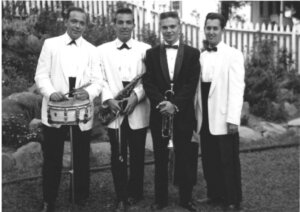
When I first heard Neil Sedaka had died at the age of 86, I posted a Sedaka song on social media. I’m a Gen-X alternative rock fan, which is not exactly Sedaka’s lane, but it’s hard not to tip your hat to a pop culture legend. I posted “Standing on the Inside,” from 1973, and told people to wait for the chorus. Then, in the comments, my friend Beth Tichler Mindes from my Camp Tranquility summer camp days, wrote a sentence that stopped me: Neil and her dad had been in a band together when they were teens in the Catskills. She’d known Neil her whole life. I asked if I could talk to her 86-year-old father, Howie Tichler, and when I got him on the phone, he told me about the time in the spring of 1958 when he first met Neil Sedaka.
I first met Neil at the Kingsway Theatre on Kings Highway in Brooklyn. I was standing in the back near the popcorn. He was next to me, wearing a high school band sweater. I asked him what school he went to, and I told him I was a musician too. He said he was a piano player and that his band was auditioning for a saxophone player for a Catskills summer gig. I said, great, I’m in. It was that quick. He told me to come down to the basement and audition.
Honestly, I was at the theater to meet girls, not to watch the movie. That’s why I was hanging out in the back.
Before the audition, I spoke to my uncle, Sid Cooper. He was a saxophonist and woodwind player with the Tommy Dorsey band and later at NBC, playing with the Tonight Show band during the Jack Paar years and into the Johnny Carson era. He made sure I was ready. I needed a rhumba, a cha-cha, a foxtrot, a jitterbug. In those days you had to know the dances.
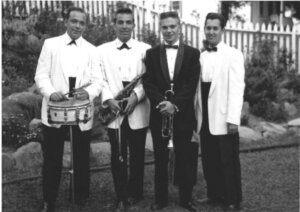
The audition was for a four-piece band. Neil wasn’t even the leader. He was just the piano player. The job was in the Catskills, at a hotel in Monticello called the Esther Manor. Esther ran the place, and her daughter, Leba Strassberg, worked behind the front desk. Neil would later marry Leba.
I don’t remember exactly how we got there. Maybe my father drove. Maybe someone in the group had a car. But we packed everything in and drove up.
When we arrived, we were told to introduce ourselves to the owner using only our first names. Half the band was Italian. In most places in the 1950s, people were hiding Jewish heritage. In the Catskills, Italian last names apparently wouldn’t go down so well. So, Eddie Caccavale became just Eddie. Paul Delova became Paul.
There were sometimes four of us, sometimes five. The group was called The Nordanels. My name wasn’t in the title because I joined a little late. The name came from Norman, David, and Neil. N-O-R-D-A-N-E-L-S.
If it was a wedding or a bar mitzvah, we wore white tuxedos. Sometimes black. At the hotels, it depended on the night of the week.
We worked six days a week, and this is no exaggeration. Afternoons, we played poolside for cha-cha lessons. Then we’d run back to our rooms, change, and play in the lobby as guests came in for dinner. After that, we played dance music before the stage show, then read the charts for the acts — usually, a dance team, a singer, or a comedian.
I was making about $85 a week, plus room and board. I wouldn’t exactly call it a room as I slept near the chicken coops. We didn’t get tips, either — unless you count being seated at dinner with the single girls.
I was born in 1939, so you can do the math. I was 18 when I started at Brooklyn College. By 1961, I was headed to Temple University in Philadelphia for dental school.
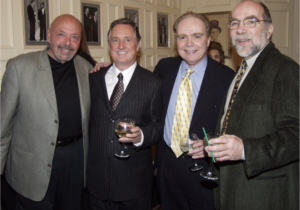
The Catskills gig helped pay for all of it as I could save every summer. Brooklyn College tuition was $15 a year, and they even threw in the textbooks. Dental school was another story. So the band gig felt like a gift.
People think of Dirty Dancing when you say Catskills. That came later. The movie is set in 1963, at a fictional resort called Kellerman’s. But the atmosphere was already there in the late 50’s and early 60’s. It was smoky. It was loud. It was hopeful.
At Esther Manor, single girls came up with their parents for the summer, and at dinner they would sometimes seat the musicians with the guests. So there we were, night after night, at long tables with our instruments nearby. We were in heaven. So were the girls.
I did this for six or seven summers. It wasn’t a one-time gig. I kept playing through my third year of dental school. After Carol and I were married, and I graduated, that era ended. From then on, I focused on dentistry. I’m a retired orthodontist, and I practiced on Long Island for about 45 years, and now I teach at Columbia. We originally lived on Long Island near my practice. My wife became a social worker and psychotherapist and opened a practice in Manhattan, so we moved halfway to the city. Once the kids flew the coop, we moved into Manhattan.
During the pandemic, we did something that still makes me laugh. Back when everything was masks, masks, masks, Carol and I were stuck in our apartment one day, and we wrote new parody lyrics to one of Neil’s songs. The original was “Breaking Up Is Hard to Do.” We turned it into “Masking Is Not Hard to Do.” I called Neil and told him we’d written these lyrics, and I emailed them over.
“Don’t take your mask away from me.
Don’t put my health in jeopardy.
If you don’t, then I’ll be blue,
Because what I am asking is not hard to do.
Remember when you held me tight.
We can’t do that now, but that’s all right.
Thinking safe will get us through,
Because masking is not hard to do.
They say that masking up is a difficult task.”
The next day we found out he’d posted it on Facebook. During the pandemic, he was doing this daily thing where he would sing three songs, and he introduced us and said we wrote the lyrics, and then he played it.
I guess I wasn’t so shocked when I heard he died, as when I spoke to him about a week ago, he was frailer than I ever heard him. But when we talked, we were right back to music.
We always talked about gigs we did together, about musicians who were on the job, and about little details he might have forgotten. For example, the last time we spoke, just two weeks ago, he said, you know that album I recorded that wasn’t very successful, where I sang a bunch of standards? I said sure, I remember it; I still have it. And he said, who was the piano player on that gig?
Our conversations were brief on family, and then we’d get into the details of the cool things we did together. It was always a walk down memory lane.
What I truly admired about Neil was his humility. He understood the unspoken thing between musicians. He knew my limitations, and he never judged my playing. He also knew I was an orthodontist. I had patients, not jam sessions. I wasn’t able to keep up my chops the way a full-time musician could, and he never made me feel like I was anything less than part of the band.
About 15 years ago, Neil called me up and said, “I’m on tour, and I have a gig at the Shubert Theatre in New Haven. My saxophone player is stuck in Montreal. Can you come do the show with me?”
I said, “Sure, but you realize you’re asking an orthodontist to sit in with an eight-piece orchestra.”
He said, “No problem. I’ll fax you the music.” Fax. That’s how long ago this was.
So the music starts flying through my fax machine, half of it unreadable. I called Neil and said, “I’m doing the gig, but don’t expect me to be reading those charts. I’m going to do it by ear.” And he said, “Great.”
I drove up the night before because we had soundcheck the next afternoon. The band was there, Neil wasn’t even there yet, one of the other musicians was running the rehearsal. I’m standing in this magnificent old theater in the middle of New Haven, and I walked up to the guys and said, “Hi, I’m Howie Tichler. I’m really an orthodontist. So go easy on me.” And the guy says, “Neil told us everything. Don’t worry about a thing. Come on up. We’ll rehearse.”
They put me right behind Neil, so the spotlight wasn’t only on him. It was on me, too. The air conditioning was blasting, and it kept blowing my sheet music off the stand, so I’m trying to keep the pages from taking flight while also pretending I belong there.
Neil was incredibly gracious. He introduced the band and he said, “This is my friend Howie Tichler, who is really an orthodontist, and he came to help me out.”
And when I left the theater, I’m walking out with my saxophone on my shoulder, and a woman stopped me and said, “Can I talk to you for a second?” I thought she was going to compliment my playing.
Instead she asked me if she needed braces.
Right now, I’m mostly thinking about the good times. Whenever he came to Manhattan we’d meet up. We went to museums together — the Met, the Guggenheim. It wasn’t always about music. Sometimes it was just two old friends walking around looking at art.
He also came to visit us on Fire Island. Within half an hour, everyone in Fair Harbor knew he was at our house. Not because of an announcement, because of his voice. We had a little portable piano, and he’d sit down and sing. Someone walking by would hear it, stop, and then word would spread.
I actually sang on his first hit, “The Diary.” It’s a doo-wop song, and they couldn’t afford, or maybe couldn’t find, backup singers, so I became the backup singer on Neil Sedaka’s first record.
But the thing I keep coming back to isn’t the credit. It’s the sound of him in the room, that voice carrying out the window. In Fair Harbor you could hear him before you saw him.
The post Before I became an orthodontist, I was my good friend Neil Sedaka’s saxophonist appeared first on The Forward.


